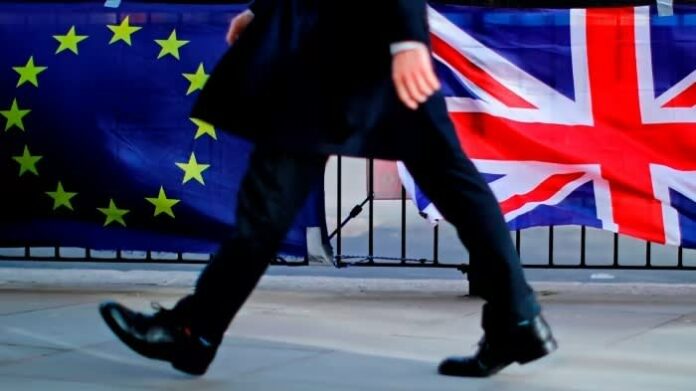Good morning. This article is an on-site version of our FirstFT newsletter. Sign up to our Asia, Europe/Africa or Americas edition to get it sent straight to your inbox every weekday morning
A plan by ministers to review or repeal all EU laws on the UK statute book by the end of 2023 has suffered another setback after the discovery of 1,400 additional pieces of legislation.
Prime Minister Rishi Sunak has started backing away from his ambitious proposals to scrub Britain’s statute book of unwanted EU laws, abandoning his promise to complete the exercise within 100 days.
Now ministers, in conjunction with the National Archives, have discovered the large bureaucratic task has gotten even bigger and that, instead of 2,400 EU laws to review or repeal, officials may have to trawl through 3,800.
Grant Shapps, the new business secretary, is said by allies to be keen to slow down the review of EU laws after being warned that hundreds of extra staff across Whitehall would be needed to complete the task.
“We will slow things down to a sane pace” — Shapps ally
Senior civil servants have warned that reviewing each piece of EU legislation to see if it is needed in the UK, or can be improved, will often have to involve external legal advice and consultation with business groups.
Thanks for reading FirstFT Europe/Africa. Do you have feedback on the newsletter? Reply to this email or reach me at [email protected] — Jennifer
Five more stories in the news
1. Cyprus accountants break from PwC to retain Russia-linked clients A group of partners at the Big Four accountant has launched a breakaway firm in the Mediterranean island to take work from Russia-linked clients whom PwC will no longer touch following Moscow’s invasion of Ukraine. The Big Four firm has operated a global “sanctioned anywhere, sanctioned everywhere” policy that goes beyond what is legally required.
2. Jeremy Hunt plans stealth raid on UK inheritance tax The chancellor is drawing up plans to extend a freeze in the inheritance tax “nil-rate band” from 2025-26 to 2027-28. The move could raise at least half a billion pounds for the Treasury, as Hunt looks to fill a hole in the country’s public finances through tax rises and spending cuts.
3. Ukraine seizes control of 5 ‘strategic’ companies from oligarchs President Volodymyr Zelenskyy said yesterday that Kyiv had transferred the strategic enterprises to state control from previous oligarch ownership as part of its wartime effort. They include the top national oil producer and the country’s largest refinery.
4. Spain rejects criticism over slow spending of EU recovery funds Madrid has brushed off corporate concerns about its management of billions of euros in pandemic recovery funds, insisting it has reached “cruising speed” in developing investment plans and will meet strict audit standards to secure its next batch of money. The country is due to receive a total of €140bn, making it the bloc’s second biggest recipient after Italy.
5. Boris Johnson: UK cannot afford climate change ‘reparations’ On the opening day of the COP27 UN climate summit yesterday, the former prime minister said Britain did not have the financial resources to pay “reparations” to low-income countries affected by climate change.
The day ahead
Corporate earnings Associated British Foods, Bayer, DuPont, Munich Re, News Corp, Pandora, Salvatore Ferragamo and Walt Disney Company announce quarterly results.
UK rail operator talks The country’s rail infrastructure owner, train operators and unions begin “intensive” talks aimed at ending months of network disruption over pay and other grievances. Concessions and the suspension of strikes have narrowed the gap between the parties.
Turkey’s president meets new Swedish prime minister Recep Tayyip Erdoğan and Ulf Kristersson gather in Ankara to discuss Stockholm’s bid to join Nato and the extradition of people the Turkish government considers terrorists. (Reuters)
Economic indicators September eurozone retail sales data and trade balance figures in France for the same month are out, while in the UK, the British Retail Consortium releases sales data for October.
US midterm elections Early voting data point to a high turnout across the country as each party makes its final pitch to Americans. Subscribe to the Swamp Notes newsletter, which is currently free to read, for a deeper insight into the intersection of money and power in US politics.
-
Big read: Georgia’s Senate race is one of the most closely followed. Washington bureau chief James Politi reports from the city of McDonough on the contest between Trump-backed Herschel Walker and Democratic incumbent Raphael Warnock.
Want to know more? This Thursday, FT journalists Edward Luce, Rana Foroohar and James Politi will be joined by veteran commentator Norm Ornstein for a subscriber-exclusive event assessing the US midterm results. Register for free today and submit questions in advance for our panel.
What else we’re reading
‘Loss and damage’ stalemate reaches breaking point It is often hard to predict what will happen at annual UN talks that, since 1995, have been held to thrash out global climate change agreements. But not this year. This meeting will focus on a divisive subject: whether rich countries should pay out to cover the costs of climate damage, writes Pilita Clark.

Pension funds after the gilt crisis Wild swings in the gilt markets, such as those caused by the Liz Truss government’s “mini” Budget in September, have taught UK pension funds an important lesson: assets that cannot be quickly converted to cash may deliver higher returns, but in a crisis pensions schemes need assets they can sell fast.
PoWs recall desperate fight for Mariupol In September, 215 prisoners in Russian captivity were released in the largest exchange since Vladimir Putin launched his full-blown invasion of Ukraine. Now they have shared their insights into a critical early battle of the war with the Financial Times. “It felt like one long day in hell”, said Major Oleksandr Voronenko.
Ngozi Okonjo-Iweala: Decoupling is not the answer to climate crisis Despite forces threatening to pull apart the world community, we simply cannot fragment, decouple economies and create separate trade blocs, writes the director-general of the World Trade Organization. At COP27, she plans to make the case for a trade-related response to climate change.
Women are big losers in the politics of pockets Asking a woman if she has an inside jacket pocket is like asking if she has a ticket to the moon. That’s good news for the $56bn global handbag market, writes Pilita Clark, but a lot of women would cheerfully do what men have done for centuries and carry everything we need in pockets.
Food & drink
London’s new Elizabeth Line seems tailor-made for an Indian restaurant crawl. Follow the FT Globetrotter’s guide to experience the full range of London’s diverse Indian dining scene — with eight restaurants less than a 15-minute walk from an Elizabeth Line stop.
Thank you for reading and remember you can add FirstFT to myFT. You can also elect to receive a FirstFT push notification every morning on the app. Send your recommendations and feedback to [email protected]







